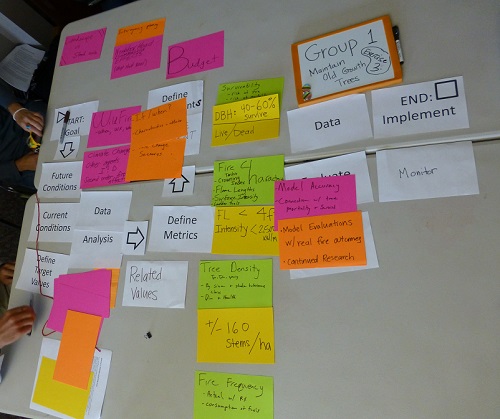Fuel treatments are a key strategy for managers to mitigate threats to firefighters and communities in ecosystems with an abundance of wildland-urban interface that is in declining condition because of insects, diseases, fire suppression, or climate change. Fuel treatment goals often focus on sustainability, desired future condition, adaptive management, and/or resiliency. However, these terms are difficult to define and typically complicate prioritization, planning, and evaluation of fuel treatments. Often it seems like objectives are clear, but when it comes time to assess if or how well objectives were met, the process becomes complicated and bewildering with no clear process or workflow to demonstrate success. This can leave managers vulnerable to litigation. In this interactive workshop, we discussed current processes used in fuel treatment analysis. Building on the experience of the participants, we developed more clearly defined workflows, metrics, and concepts to help evaluate fuel treatment success.
This workshop focused on building a logical and methodical workflow for a fuel treatment project that could have its success evaluated critically. The focus was on the workflow development process without thinking too much about modeling and software details. The process was iterative, allowing for details and complexity to be added after solidifying general ideas and procedures. This workshop has the potential to be adapted to other complex or large-scale management projects or procedures. If you modify it to serve some other purpose, please let us know how it worked.
Workshop instructions and materials are available here (check the Files block) so you can conduct a similar exercise with your agency or land management group.
Event Details
May 19 2014, 1 - 5pm
